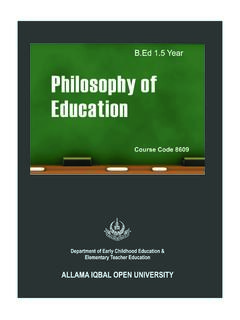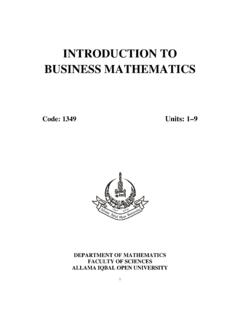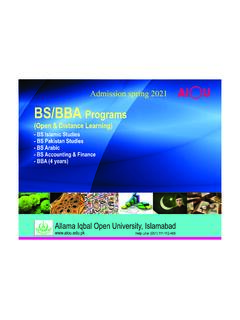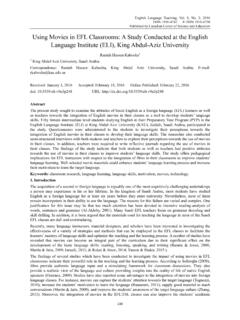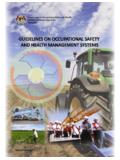Transcription of PAKISTAN STUDIES
1 PAKISTAN STUDIES (Compulsory) For BS Course Code: (9374) Units: 1 9 Department of PAKISTAN STUDIES Faculty of Social Sciences and Humanities ALLAMA IQBAL OPEN UNIVERSITY, ISLAMABAD ii (ALL RIGHTS RESERVED WITH THE PUBLISHER) 1st Edition .. 2019 Quantity .. Price .. Publishing Supervisor .. Printer .. Allama Iqbal Open University, Islamabad. Publisher .. Allama Iqbal Open University, Islamabad. Course Development Coordinator: .. Dr. Khalid Mahmood Editor.
2 Ms. Humera Ejaz iii COURSE TEAM Chairman: Prof. Dr. Samina Awan Course Coordinator: Dr. Khalid Mahmood Writers: 1. Prof. Dr. Muhammad Reza Kazimi 2. Dr. Khalid Mahmood 3. Mudassir Jattala 4. Sayed Akmal Shah \ Reviewers: 1. Prof. Dr. Samina Awan 2. Prof. Dr. Sayed Jaffar Ahmed 3. Prof. Dr. Fazal-i-Rahim Marwat 4. Prof. Dr. Anwar Shaheen 5. Dr. Sajid Mahmood Awan 6. Dr. Umar Hayat 7. Dr. Kishwar Sultana 8. Dr. Kausar Parveen Editor: Ms. Humera Ejaz Layout & Design: Malik Mateen Ishfaq ivFOREWORD Allama Iqbal Open University has the honour to present BS Programs in various faculties for those who are deprived from regular education due to their compulsions.
3 It is obviously your own institution that provides you the education facility at your door step. PAKISTAN , our beloved country had been facing numerous issues since its creation. The initial days were very tough for the newly state but with the blessings of Allah Almighty, it made progress day by day. However, due to conspiracy of external powers and some weaknesses of our leaders, the internal situation of East PAKISTAN rapidly changed and the end was painful as we lost not only the land but also our Bengali brothers.
4 After the war of 1971, the people and leaders of PAKISTAN were forced to rethink the future of the remaining country. Another issue was that the democratic system of government could not be developed due to various reasons. However, PAKISTAN also carried on its economic and social development to some extent under the Martial Law period. Today, we need the study of various aspects of Pakistani society. PAKISTAN STUDIES is the collection of many subjects including history, culture, economy, languages, international relations, politics and geography etc.
5 As a compulsory subject this course would fulfill the requirement of students at BS level. I am pleased that a new course book of PAKISTAN STUDIES (compulsory), for the students of BS of various faculties of Allama Iqbal Open University, Islamabad, is now available. The book in your hands in the latest course of PAKISTAN STUDIES developed for you. Its units have been written by the experts of the subject and I am hopeful after studying the book you will acquire the authentic information and facts about the history, ideology, society and culture, economy and foreign policy of PAKISTAN .
6 July 2019 Prof. Dr. Zia Ul-Qayyum (Vice Chancellor) vINTRODUCTION Allama Iqbal Open University Islamabad has started BS Programme in its various faculties. The Department PAKISTAN STUDIES has the honour of developing many courses for the university students from metric to M Phil. This course is developed according to the requirements of Higher Education Commission of PAKISTAN . The course fulfills the needs of the students regarding their queries about PAKISTAN . This course comprises nine units consisting of three credit hours.
7 The chapters of the course have been written and reviewed by the experts of the subject. Unit one describes the ideology of PAKISTAN and the old civilizations including the Indus Valley and Gandhara. The role of Muslim traders in sub-continent and Hindu-Muslims relations has also been discussed. Sir Syed Ahmad Khan, Allama Iqbal and Quaid-i-Azam Muhammad Ali Jinnah cannot be separated from the Ideology of PAKISTAN ; therefore, the author also discussed the ideas of these leaders. At the end of the unit the objectives of creation of PAKISTAN have been discussed.
8 Origin of Sufism and role of Sufis within South Asia is discussed in the second unit. The contributions of Hazrat Ali Hajveri (Data Ganj Bakhsh) Hazrat Khawja Moinuddin Chishti, Shah abdul Latif Bhittai and Rahman Baba are discussed in this context. Moreover, the services of Sheikh Ahmed Sirhindi, Shah Wali Ullah and Sayed Ahmed Shaheed are also discussed in this unit. Unit three has been written regarding the educational movements of the Muslims of South Asia after the War of Independence (1857).
9 The services of Sir Syed Ahmed Khan are recognized in the organization of Aligarh Movement. Some other contemporary educational movements including the Darul Uloom Deoband, Darul Uloom Nadwatul Ulema, the Jamia Millia Islamia and the services of Islamia College Peshawar are also highlighted in this chapter. Unit four of this book focused on the British Rule and Separate Muslim Identity in the subcontinent. The causes, events and effects of the war of independence of 1857 are also described in this unit.
10 The chapter also provides detailed knowledge about the struggle of Muslim leaders on South Asia under the banner of All India Muslim League. Unit five is the continuity of the previous unit while the writer has discussed the Nehru Report, the Fourteen Points of Muhammad Ali Jinnah, Lahore Resolution, the August Offer, the Cripps mission and the cabinet Mission Plan. The third June Plan, the Indian Independence Act 1947 and the Radcliffe Award have also been elaborated by the author. The next unit evaluates the constitutional and political development in PAKISTAN from 1947 to 1971.
